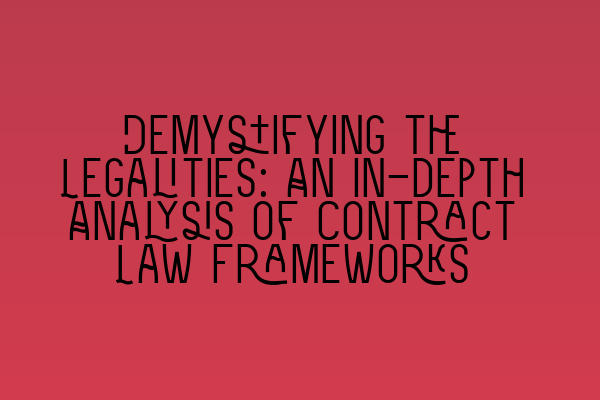Demystifying the Legalities: An In-depth Analysis of Contract Law Frameworks
Contract law is a fundamental aspect of legal practice, governing countless transactions and agreements in various industries. Understanding the intricacies of contract law frameworks is essential for solicitors and legal professionals alike. In this article, we dive into the depths of contract law, dissecting its key components and demystifying its complexities.
The Basics of Contract Law
At its core, contract law is concerned with the formation, interpretation, and enforcement of agreements between parties. These agreements can range from simple service contracts between individuals to complex commercial contracts between multinational corporations.
The binding nature of contracts ensures that parties involved must fulfill their obligations as stated within the agreement. When one party fails to meet their obligations, or if a dispute arises, contract law provides a legal framework for resolving these issues.
Formation of a Contract
A contract is formed through a process known as offer and acceptance. One party makes an offer, and the other party accepts the terms of the offer. This acceptance must be unconditional and in accordance with the terms specified in the offer. If these elements are present, a legally binding contract is created.
It’s important to note that verbal contracts can be just as legally binding as written contracts. However, written contracts provide a clearer record of the agreed-upon terms and offer better protection against potential disputes.
Key Elements of a Contract
Contracts generally consist of several essential elements:
- Offer: A proposal made by one party to another, indicating a willingness to enter into a contractual relationship.
- Acceptance: The unconditional agreement to the terms of the offer. Acceptance can be expressed either verbally or in writing.
- Consideration: The exchange of something of value between the parties. This can be money, goods, services, or even a promise to perform or refrain from performing an act.
- Intention to Create Legal Relations: Both parties must have the intention to create a legally binding agreement.
- Capacity: The parties involved must possess the legal capacity to enter into a contract. This means they must be of sound mind and above the age of majority.
Understanding these key elements is crucial when drafting, reviewing, or litigating contracts. Each element must be carefully considered to ensure the validity and enforceability of the contract.
Interpretation and Enforcement of Contracts
The interpretation of contracts can sometimes lead to disputes due to differing interpretations of the contract’s terms. In such cases, the court will look at the objective intentions of the parties and consider factors such as the contractual language, the surrounding circumstances, and the reasonable expectations of the parties at the time of entering into the contract.
Enforcement of contracts is typically achieved through legal remedies. When a party fails to fulfill their obligations under a contract, the aggrieved party may seek remedies such as damages, specific performance, or injunctions, depending on the situation and the terms of the contract.
SQE and Contract Law
If you’re a law student or a legal professional preparing for the Solicitors Qualifying Examination (SQE), understanding contract law is vital. The SQE assesses candidates’ knowledge and skills in various legal practice areas, including contract law.
To excel in the SQE, it’s crucial to have a solid understanding of the principles and frameworks of contract law. Preparing for the SQE involves comprehensive study and practice, including MCQ practice exams and mock tests. Practice exams and mock tests help you evaluate your knowledge and familiarize yourself with the exam format, enhancing your chances of success.
SQE 1 Practice Exam Questions and SQE 1 Practice Mocks FLK1 FLK2 are valuable resources to supplement your contract law study for the SQE exams. These materials provide real exam scenarios and questions to test your comprehension and help you identify areas for improvement.
Preparation courses, such as SQE 2 Preparation Courses and SQE 1 Preparation Courses, are also highly beneficial in consolidating your knowledge and enhancing your understanding of contract law and other key legal practice areas covered in the SQE.
Stay up-to-date with the latest developments in the SQE by regularly checking the SRA SQE Exam Dates. The exam dates and related information will keep you informed and ensure that you’re well-prepared and ready to excel in your SQE exams.
Conclusion
Contract law is a critical aspect of legal practice, and understanding its frameworks is essential for solicitors and legal professionals. By grasping the basics of contract law, including contract formation, key elements, interpretation, and enforcement, you can navigate the complexities of contract-related matters with confidence and expertise.
If you’re preparing for the SQE, dedicating time to study and practice contract law is crucial. Utilize resources such as SQE 1 practice exam questions, practice mocks, and preparation courses to strengthen your knowledge and maximize your chances of success.
Remember, when it comes to contract law, knowledge is power. Arm yourself with the right information and tools to excel in your legal career.
